Devon Trevarrow Flaherty's Blog, page 19
September 9, 2023
Book Review: The Graveyard Book
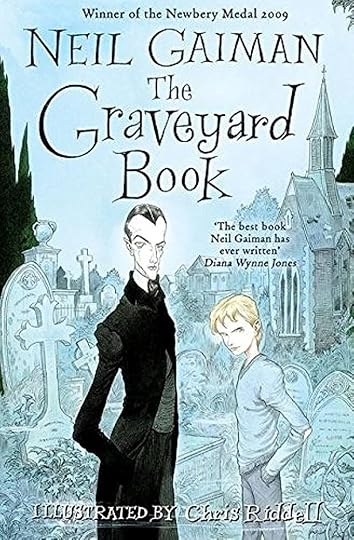 Image from Amazon.com
Image from Amazon.comFinally, a Neil Gaiman book that really agrees with me. Everyone else seems to admire his work so assiduously, but me… it either wasn’t my flavor (American Gods) or I thought it was not very good (The Ocean at the End of the Lane). While I had no idea what was coming to me with The Graveyard Book (technically, children’s) book, I was pleasantly surprised. It is the kind of creepy book that would be great Halloween reading for a middle schooler, but it’s also a book that reads across-ages with its classic feel.
Based on The Jungle Book (or Books, depending on who’s saying it), The Graveyard Book (now I understand the title!) is set in more modern times. The boy in question, instead of Mowgli, is Nobody Owens (Bod for short) and he is not raised in the jungle by animals but in a graveyard by ghosts. It is a series of vignettes, like the original, underscoring coming-of-age lessons as Bod grows from a boy into a young man, but there is also a narrative flowing through like a sleer (consistent with the original). Though he may not remember it, Bod has a past, and his past has not forgotten him or how it wants him dead. But there are friends among the tombstones sworn to protect him and they might know more than they’re saying, but it’s all to keep Bod alive until he can do it himself.
I did say the book was creepy, but this is not true in the way you might think. One of my favorite things about The Graveyard Book is that the usual bad guys are good guys and the usual good guys are bad guys. Not predictably, but my point is that The Graveyard Book turns our assumptions of what is truly scary on its head and we find our favorite heroes among the haunts and witches, while the normal streets of an English city are teeming with the real evil. And Bod learns some of these lessons along with us: just because we don’t understand something doesn’t mean it should be feared.
I also said this book is vignette-y, which is not really my thing. However, the narrative winding its way through the vignettes really saved it for me. I would have liked a more novel-esque reading experience, but then it wouldn’t be very similar to its source material, and there’s something strangely fresh about the old fashioned feel. There is another thing, though, which I both enjoyed and disliked, simultaneously, and that is the varied ages (not quite the word) of the graveyard ghosts (and other creatures). Since people had been buried in the graveyard since the Celts, there are ghosts from Roman occupation all the way to thirty years before the “present,” and this was fun to think about and to read. Ghosts had different accents, different ways of dressing and doing things, and different ideas about all sorts of things. This plays out in many ways in the book, including Bod’s education and in how the ghosts live one with another. But it also confused my imagination, now and again. It’s hard to keep all the characters in their right accents, clothes, and attitudes when they’re all mashed up like that. I often wanted to just set the whole thing in a Dickens novel, in my head. Hard to keep up. But rewarding.
Though The Graveyard Book gets points for fun imagination, a nod to classic, clear writing, memorable characters, and a slow build of the tension, there are a couple things I could have done without. First, the backmatter. In the copy I have, there’s a very small amount of information about the author and book—very small—and then a super lame question and answer session where either the person asking the questions is clueless as to Gaiman himself or Gaiman is being a buttface, because none of the questions are actually answered, and the diverted answers are very brief. Also, I did NOT like the illustrations (by Dave McKean). They’re just weird, like scribblings or sketches with no eyeballs and obscured pieces that mostly read as trippy. What am I looking at?!
I still have plans to one day read The Sandman (series), Coraline (a favorite movie), Fragile Things, Unnatural Creatures, “The Flints of Memory Lane,” Violent Cases, Neverwhere, and Stardust (all listed somewhere on my best books lists). So many people love Gaiman, and I am beginning to really respect his versatility as a writer, jumping around from one far-flung project to the next, always creepy and yet so different, following his intuition and creativity wherever it happens to take him.
QUOTES:
“If you dare nothing, then when the day is over, nothing is all you will have gained” (p217).
“You’re always you, and that don’t change, and you’re always changing, and there’s nothing you can do about it” (p278).
*There were a few more quotes, but I did not have a pen handy while I was reading most of the book, so I have lost them. My apologies.
MOVIE
The Graveyard Book movie has been in talks for more than a decade. Currently, from what I can tell, Disney+ is sitting on it and refuses to let it go or turn it into a series or even a musical or play. Gaiman just sort of sighs about it. Honestly, I think it would make a great movie, but often the gears of movie-making grind in mysterious and stupid ways.
September 8, 2023
Book Review: Meander, Spiral, Explode
 Image from Amazon.com
Image from Amazon.comThis is a book for writers. I suppose it could also be a book for readers, especially those in the academic, literary criticism vein. At any rate, it had been zinging across my path like a ping pong ball, for something like a year, as every writer around me read it and talked about it and recommended it. And yet, I was not super into it. I read it. It had some interesting things to say and was written in a thoughtful, calm, (academic,) even literary voice, which I think is what made it so popular with the writers (and will probably recommend it for use in college classes). But I didn’t think it said anything much exciting or innovative, nothing that I didn’t already know by just being a writer and a reader. So for all the claims made on it (including using it to justify a structure so weird it was alienating which is another way of saying lazy plotting), I was underwhelmed by the content.
Meander, Spiral, Explode: Design and Pattern in Narrative by Jane Alison is a book about alternative structure in story-telling. It is, according to what others told me, a treatise meant to overthrow this outdated (and very plebian) notion that the hero’s journey (or whatever you want to call it) exists because it is what speaks to the human imagination, that it is old as the hills, and that it can he found at the heart of all successful stories. No! Indeed, there are other ways of telling stories which are not linear, not built on the rise and fall of the old, mountain-shaped, plot diagram! Filled with examples (from literary fiction, explicitly, if I remember correctly), Meander, Spiral, Explode is Alison’s apologetic for abandoning the usual structure—for critiquing it and possibly poo-poo-ing it—and for experimenting with story structure, and this for the betterment of literature. Vive la innovation! Sections of the book are devoted to specific, alternative structures (though the list is, obviously, not complete), what she calls “patterns”: waves; wavelets; meanders; spirals; radials or explosions; networks and cells; fractals; and tsunami? (yes, with the question mark).
It’s not unusual for me to argue with a book as I read it. This doesn’t always mean that I don’t appreciate the book. But sometimes it does mean that I have a problem either with the logic or the basic assumptions, and I had a problem here with some basic assumptions, namely that the patterns she is naming are mutually exclusive to a more traditional plotline. (I don’t believe they are.) I also find fault with the working definition of plot or pattern or structure or form or whatever, and we’ll talk more about that in a blog I’ll be writing soon. But the short of it is that there is a difference between plot/pattern as a journey through the story from page 1 to “the end” and plot/pattern as a journey through the actual story, like in its more chronological presentation. Alison does not distinguish between these (because, quite frankly, I’ve never seen anyone else distinguish between them which I think is a gaping hole in literary criticism and creative writing education, but whatever). Which means that we sometimes lose our way in understanding her patterns, I think. It is much more common, you see, to vary the pattern in the telling than it is in the story’s storyboard-y plot. I will move on, because I could get stuck here for days. Suffice it to say that Alison and I were not always on the same page.
But I was still looking forward to exploring these interesting patterns which Alison was about to elaborate on. I will give her this: many of the examples she gives us are beautifully written. And I was happy to sit and muse about pattern in the books and stories I am reading and writing, right now. I will be considering her patterns as I deal with structure in my own stories, for sure, and I will be on a hunt for pattern in stories I read, in the future, too. But I was underwhelmed, overall, by what I read in Meander. Personally, I tend to write stories—novels in particular—in what she would call spirals, explosions, or even cells. I have purposefully reigned in some of these tendencies because I have found that they lose the reader if they don’t also contain a more traditional story pattern. But that’s just it: the basic story pattern is still contained inside the other, if we want to do everything for the reader from entertain to instruct. I didn’t find that Alison’s celebration of alternative pattern was anything but saying the same old thing in a different way. I wrote in the margin, at one point, “I’m beginning to think this is just a way of seeing the same thing… or at the most, styles.”
There is a phase that most humans go through on their journey of maturation, which I call the “head up their own a*#” stage. For people who remain in the academic fields long after young adulthood, there is a danger of stagnating in this stage, even multiplying on it. I find this happens in the writing world, plenty, and has caused a false dichotomy between the more practical writers and the more idealistic writers. While I feel like Meander, Spiral, Explode has been used to argue against a hero’s journey sort of format for stories, I think (and have argued on this blog) that the differences between higher forms of innovation versus tried and true forms that engage the masses are highly exaggerated. (By the way, Alison’s actual thesis is more that story forms emerge from natural patterns we find in nature.) In that case, I enjoyed Meander, Spiral, Explode—and you can, too!—for sitting still and considering the ways that stories are being told to you and, more importantly for me, the many ways that they can be told. (In truth, I think this idea could have been done in an article and what I learned from this book was limited, still, it’s worth considering reading it.) Very few stories would not benefit from careful attention to their structure, including the entertaining of more out-there presentations. Yes, experiment with the pattern! Listen to the story and see what interesting way it might be better told! But don’t underplay the reader. Stories, if they are to be shared, should be clear and approachable, and drawing from tradition is one surefire way to understand the magical mechanics of how humans communicate, imagine, explore.
QUOTES:
”But what I hope is that thinking about patterns other than the arc will become natural, that evolving writers won’t feel oppressed by the arc, that they’ll imagine visual aspects of narrative as well as temporal, that they’ll discover ways to design, being conscious or playful with possibilities” (p24).
“So, a fundamental way to design narrative is to work with a range within our smallest units, from syllable to word to phrase, clause, and sentence, much as you’d plant a garden with different leaves: pixelated baby’s breath, spike of aloe, palm” (p31).
“The same epiphanies every week…” (p96).
“’Part of me wanted help,’ he says. ‘But there was another part’” (p100).
“The questions a spatial narrative asks are not ‘what happens next?’ but ‘why did this happen?’ and, more complexly, ‘what grows in my mind as I read?’” (p202).
September 6, 2023
Trilogy Review: Shadow and Bone
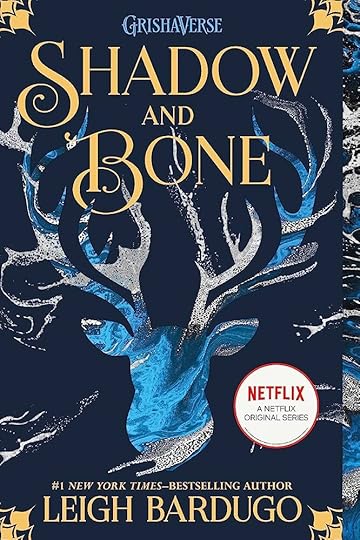 Image from Amazon.com
Image from Amazon.comI went into Shadow and Bone with very high expectations. Written after Leigh Bardugo’s Six of Crows series but meant to be a prequel of sorts (though including none of the same characters), I figured this would be at least as good as Six of Crows and Crooked Kingdom (the duology). I was a little disappointed. Not crazy disappointed, as I think the story and characters here stand alone as an exemplary, fantasy series, but they did not have quite the spark that the Six of Crows did. Even so, I enjoyed reading my way through the lighter, less complicated trilogy, because it did have plenty of twists and quite a lot of depth for a YA series brimming with Bardugo’s characteristic exploration of morals, bad baddies, imperfect goodies, and steamy yet never-straightfoward romances.
Shadow and Bone takes place thirty years before Six of Crows, in a war-torn Ravka split in half by the Shadow Fold: a gaping, dark wound in the landscape that is nearly impossible to cross, and impossible to cross without risking a violent death in the dark, being ripped apart by the terrifying volcra. But when two orphaned childhood friends turned army grunts make their way across, an unexpected turn of events reveals that one of them is not who either of them thought she was. She’s whisked away, then, to train under the intimidating general of the grisha (magical) army, but there is nothing that can keep these two apart forever, not even the Black Heretic. Still, plenty will get in their way, from friends turned foes to foes turned allies, the promise of power, of new love, about 100 brushes with death, loss, and not knowing themselves. Across the Fold, an ocean, underground, chasing legendary stags and sea creatures and moving from a palace to an underground city of caverns to a refuge in the sky, the love story will turn love pyramid and a girl will grapple with both power and sacrifice in a world where it’s hard to know who to trust.
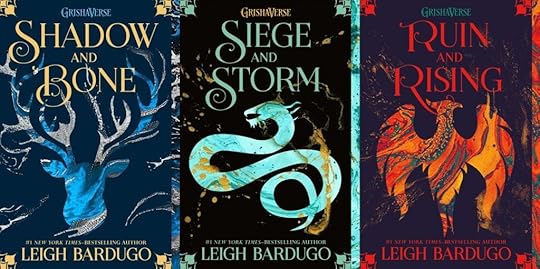 Image from The Fantasy Review.
Image from The Fantasy Review.As I said, I read the Six of Crows duology first, which was written first but takes place chronologically after this trilogy (and so I have seen it recommended to read Shadow and Bone first, but I have also seen it recommended the other way. I think I would say to read Shadow and Bone first, but I would warn you that the series are actually quite different, especially in tone). I already think Bardugo is flippin’ amazing, but I will admit that Six of Crows took me a minute to get into and it was awhile before I realized I was reading some of the best modern—and especially YA—fantasy out there. When reading Shadow and Bone, however, Bardugo caught me from the very beginning. Why? Because she focuses in on the relevant characters. I don’t hate what she did with Six of Crows (jumping into the action and the world by giving us a very dramatic scene not involving the main characters), but focusing on character development while planting both feet in the world and the stakes (life or death, and love or loss from the beginning!) worked so well I would like to use it as an example for a writing course.
As I also already said, don’t expect this series to be much like the Six of Crows duology, even though they are related and in the same universe (the Grishaverse). They are similar in the world and in the excellent writing (especially for YA fantasy) as well as excellently-drawn characters that engage all the way through. However, whereas Six of Crows was gritty and edgy, focusing on criminals and outcasts in the underbelly of city life (with six POV narrators), Shadow and Bone zooms in on one girl and her hero’s journey involving abandonment, power, and romance. It is much lighter in its feel, even though there are themes of heaviness and sweeping metaphors for all sorts of evil. The series is, well, calmer (and the individual books are significantly shorter), and I can see someone like my daughter much more likely to enjoy a more focused, girl-power series than the other, though I probably liked the frenetic romp (despite the grit) better.
I don’t think I’m going to break this review down into the individual books, because they really work in concert and not at all by themselves. Also, my comments on all three are pretty much the same, which I guess means they are consistent. The first book is the titular Shadow and Bone, followed by Siege and Storm and Ruin and Rising. I could never keep the titles straight, for obvious reasons. Siege and Storm is a fairly forgettable book and it sort of disappears between the first and final books, though it does take us on some adventures and introduce us to some very important characters (or one, at least). I mean, that’s all fine. I life the trilogy. I really like Leigh Bardugo. And I moved quickly on to Ruin and Rising because I wanted to know what was going to happen!
Upon finishing, I was satisfied, at least mostly. As a reader, I had to give up some of my wants to make way for the story that was inevitable, even if sometimes painful. It’s good. There are some sad moments. Many things resolve. Plenty of twists. Which leads me to this: once again, I am a fan of Bardugo’s straightforward writing, her twisty plots, her engaging love stories, and her complicated characters. I am not as big a fan of her world-building, but I did find it less confusing in Shadow and Bone than I did in Six of Crows. The Russian connection to her fantasy world is much more evident in Shadow and Bone, and though that’s not my favorite choice, it worked better than leaving me hanging. I was hoping that the Netflix series would help me visual some of the things (which Bardugo is not quite so amazing at describing), but, well, you can see my review below. What I’m saying is, again, I didn’t find the Grishaverse to me very immersive or enticing, but I do find the story and characters to be very compelling. I would read it again and I would definitely recommend it, though for my part I enjoyed Six of Crows more (and can understand if that is not a universally-held opinion).
PS. Not a fan of the covers I see most in the stores, the ones I have posted here. They don’t do anything for me and I don’t think they represent the series in any helpful way.
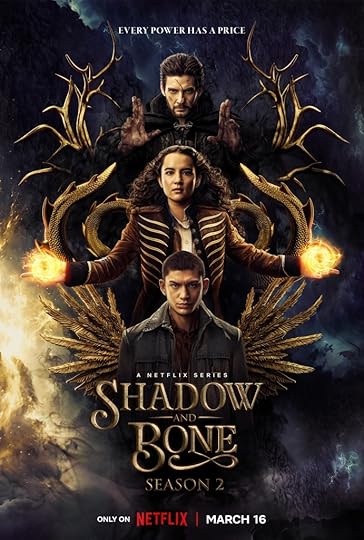 Image from IMDB.com.
Image from IMDB.com.TV SERIES
I know that this Netflix series (currently in between the second and third seasons) had done pretty well. I just don’t agree that it’s a good show. I can see that Netflix sunk some real money into it, but as a fan of Bardugo’s writing, I found it really disappointing. I am not exaggerating when I say I think “they” made ALL the wrong choices. Maybe the actors could be okay, which means we’ll blame it on the material, but they sucked. The plots were so boring, which takes a lot of messing things up, because the original plots were intricate, involved, and compelling. As were the characters, which in the TV series all come across completely flat. And I kinda sorta get why “they” would want to weave the Shadow and Bone series with Six of Crows, but… it was a bad idea to begin with, driven simply by money, as far as I can guess, and it played out even worse than I feared. In order to make the thing work, they stripped back both plots to the bare bones and then, well, then they threw everything Bardugo created out in Six of Crows (at least for the first season) and half of Shadow and Bone and made these cheesy, shallow characters do really contrived, inexplicable things for some sort of laugh/recognition of the Grishaverse. Bardugo’s actual world-building is my least favorite part of what she does (see reviews), and it’s practically all that remains in this terrible series. The whole thing is a travesty, especially if you actually like the original stories at all. If you haven’t read them, well then I can’t see what would draw you to these confused, random episodes about super boring characters who haven’t a spark of genius (Six of Crows) or magic (Shadow and Bone) about them. As for real romance (which involved six, complicated pairs in Six of Crows and one girl in the middle of a love-pyramid in Shadow and Bone), don’t expect any that work well in this TV series (let alone pain, suffering, grit, even darkness). No romance for the characters. And none between you and the story. It’s just a cheap, cheesy show that completely misses the point (oh, and the entire plot) of both of the book series and left me either yawning or rolling my eyes.
Then again, we did get to see a visualization of some of the places and characters. So maybe watch an episode on silent. And ignore Alina (the main character) because she’s all wrong. Mal, kinda, too.
August 28, 2023
Two Writing Movie Reviews
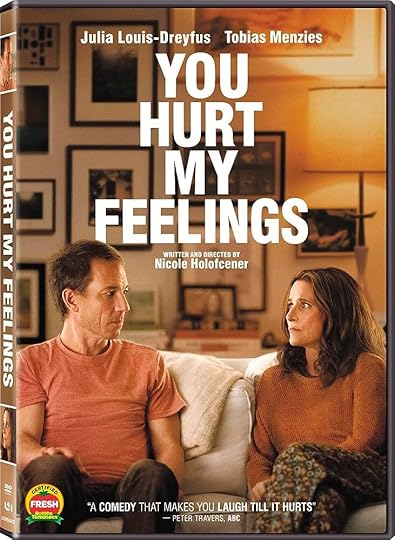 Image from Amazon.com
Image from Amazon.comYOU HURT MY FEELINGS
I am quite behind on my posts, here, due to some major life changes. And the summer is always busier than one anticipates, isn’t it? But back in the early summer, my husband and I went to the theater to see a smaller movie titled You Hurt My Feelings. Since it is about writing/a writer, I will review it here and then maybe you’ll see it. It is no longer in the theaters. It is available to stream into your home at Vudu, Amazon Prime, and maybe AppleTV. You could also purchase it as a DVD somewhere or other.
You Hurt My Feelings, starring Julia-Louise Dreyfus and Tobias Menzies, is about the marriage of a middle-aged couple. The plot revolves around Dreyfus (as Beth)’s career as a memoirist and creative writing teacher. She has been working on her first novel for some time and seems to be a bit stuck when she overhears her husband (Menzies as Don) giving his “real” opinion about her writing to his bestie. Obviously, the opinion is not only unfavorable, but in contrast to what he has told her for years. This throws Beth into both a career-downward spiral and a marriage-downward spiral. She confronts. She questions. She mopes around. But we discover, quickly, that this movie isn’t about writing at all. It’s about marriage. It’s about endurance in relationships. It’s about giving your loved ones some space and, indeed, grace. It’s about the dysthymia of getting on in years, dealing with adult children, and being sick and tired of your job—or maybe just being bad at it, about being bad at things. And it has a great, modern, tongue-in-cheek title: You Hurt My Feelings. Don’t we all?
We liked this movie, maybe even more than we expected. Well, maybe. We didn’t have many expectations. We just thought the title was funny. But we have AMC A-List and so we got our tickets and were pleasantly surprised. Some of the younger peeps coming out of the theater said it was “boring” and made other comments that meant they just didn’t get it, so maybe you have to be more mature to appreciate the life-things that are being addressed in this movie? I totally got and appreciated them, and so did Kevin, so much so that for our anniversary like a week later, Kevin gave me a pair of gold, leaf earrings in reference to this movie, and we just looked at each other and laughed and our daughter looked at us funny and we laughed harder because we had basically just recreated a scene from the movie, half on accident. Not that this one is a favorite movie, exactly. It was a little slow, and perhaps not for everyone. But it was chock-full of interesting moments about real-life, committed relationships, interesting characters, mid-life challenges, and featured older actors—leaving their wrinkly necks and eye-bags on display for a celebration of both beauty and normalcy at a more progressed stage of life. The overall experience of the movie is memorable, too.
As for the writing as a topic, I kinda can’t remember much about it except that it fell into that too-easy trend that most movies about writing fall into. In other words, the writing process (including eventual success) is too smooth and too fast, at least at one critical step. While much of the movie is a little more realistic about the struggles of a writing career, the ending included some sped-up timelines (including publication) that made me roll my eyes. Then again, by then I knew I wasn’t there for the writing life. I was there because this was a special movie, something different and refreshing, and one that is well done. And for the record, Rotten Tomatoes LOVES it.
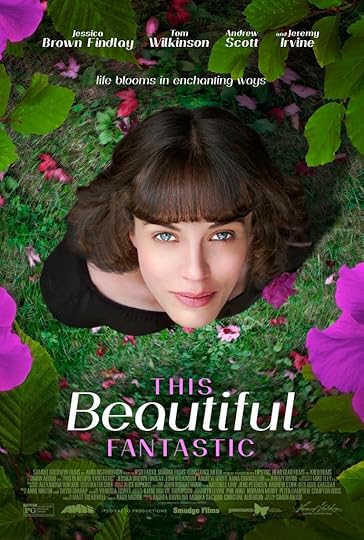 Image from IMDB.com
Image from IMDB.comTHIS BEAUTIFUL FANTASTIC
Not long after this, the internet that is now my TV plopped a trailer in front of me for This Beautiful Fantastic, a 2016 British film starring Jessica Brown Findlay. I couldn’t resist. Not only does the main character, Bella Brown, want to be a writer, and works in a library, but in the trailer the movie comes across as magical, quirky, and, well, British, which are three of my favorite adjectives involving both cinema and life in general. The preview looked pretty lush and the plot sounded pretty fun—Bella Brown is agoraphobic but is thrown into a relationship of sorts with her cranky, old, man neighbor when she has to fix up her neglected garden or be ousted from her rental flat. This interaction opens up interactions with other people, including the single-dad housemaid/personal chef of said neighbor and an imaginative, mad-scientist guy who frequents the library. Both are romantic options, dangling in front of the viewer and all three of these younger characters are cute as heck (by which I don’t just mean physically).
The components of a quirky, fun romantic comedy were there but every once in awhile it went way off the rails—just for moments at time—and it ended up reading more like a student movie than a serious or even widely-appealing artistic one. (Like seriously, there were these moments when it was like, “Did they really just choose in editing to use the same filter that’s on my iPhone? What is happening?) Also, there were some major movie-plot holes, like how the love triangle (which was so obvious) is ignored (what the heck?), and how the protagonist doesn’t interact with the twins (so why have them there at all?). And the plot overall felt muddled and jumpy, sometimes like it was too obvious, too present. The movie had promise but was too bumpy of a ride for a whole-hearted recommend, and I wasn’t at all satisfied with the ending, especially romantically. Roger Ebert ripped it a new one but the ratings otherwise are okay to pretty good.
As for the writing as plot, it’s sort of a half-hearted thing, not at all central to the story or even Bella Brown’s character. Even still, for good measure, Brown treats her library job with loose hands and then—no surprise at all—finds herself a writing career practically laying out on the street for just anyone to pick up. Big sigh. Makes a good ending, I guess, for all aspiring writers to get handed publishing contracts with the alacrity of audience members receiving giveaways on an Oprah’s Favorite Things episode. Another sigh. Even if they haven’t the real passion or even special skills needed to accomplish it. On the other hand, there were some cute and fun things about the movie in general. So I guess I would recommend a once-view of this movie if it sounds like your type. It’s technically a modern fairy tale and it has some promise. But personally, I was let down by this movie; it didn’t deliver on several levels.
August 21, 2023
Book Review: Never Let Me Go
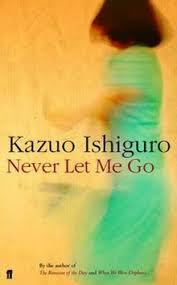 Image from Amazon.com
Image from Amazon.comNever Let Me Go is science fiction, British, and YA (even though it is frequently also read and enjoyed by grow-ups). It is also written by a widely lauded author (Kazuo Ishiguro) and seems to always be around, “your next read.” But while I expected to like this book as much as, say, The Perks of Being a Wallflower, I didn’t. There were things I have to admit I did like about it; the buzz about this novel isn’t all wrong or wayward. But there were things that I really didn’t enjoy and reminded me of my fated read of The Buried Giant, which is one of Ishiguro’s almost-flops. As with the other book, I loved the idea of Never Let Me Go, and what’s more, I loved the pacing and the slow release of information. However, I felt held at arm’s length with these characters and like various moments were not at all well-played.
Hailsham is a high-end English boarding school in a 1970s that is more like an alternative historical setting which feels slightly near-future. Told in jumps back and forth between Kathy’s upbringing at Hailsham and her current adulthood in the (alternative) 1990s, we immediately get a sense that not everything is as it seems. But we don’t know what is awry, exactly, and that is one of the main points of the book: a slow unveiling of the reality of Hailsham and of the students who attend, including Kathy and her two closest friends, Tommy and Ruth. I agree that it is best to read this book without knowing what it really is or having any spoilers, as the mystery is one of the best parts. There is romance. There is coming-of-age. There is a creepy chill, and consideration of society and the people in it through the lens of historical dystopia.
(I want to take a moment to explain why I have been absent from the blog for a month. When I returned from my second summer vacation, I threw myself and time wholly into getting my daughter ready to first go to Italy and then off to college. With my son also headed to his second year of public schooling, I had to put my work on pause, take a personal sabbatical, as it were. That’s all we need to know about that. Back to the review and back to work.)
Kazuo Ishiguro is, at least in literary circles, an author that is much admired and his books are spoken of with respect, his next books looked forward to with much anticipation. He won the Nobel Prize for Literature in 2017, though that is only one of many awards for his novels, short fiction, and even collaborations. I would say that his most lauded book is The Remains of the Day, a book I have still not read, followed by Never Let Me Go. Until now, the only book I had read of his was The Buried Giant, though I felt guilty about this lack. Ishiguro, a British author (born in Japan), is a genre-jumper, which is pretty cool. The Buried Giant was something like historical fantasy. The Remains of the Day, I know from the movie, is historical fiction and maybe a little romance. As I said, Never Let Me Go is YA with a whiff of sci-fi and a romance. I didn’t know that going into it, but I was pleasantly surprised.
I understand why Ishiguro decided to speak in Kathy’s voice in the way that he did, but I didn’t like it and I felt very claustrophobic inside it. I felt like I was wearing a marshmallow suit and I never could get the full picture of the surroundings and people and even relationships. The voice was very wooden, very strange and sterile for the story that was being told (at least regarding the relationships). The pacing was the best part, especially the pacing of the revelations—which are central to this story. Again I will warn you: you should read this book without looking into it, really. (But if you already have, it would still be worth reading.) Another warning: there is lots of sex in the second half but it is almost completely sterile in its presentation (which you’ll have to read to believe, I think). Although there are a number of ways you could walk away from this book, my big thought was: are we supposed to ask if Kathy has a soul? The limited perspective makes me feel like I didn’t have enough range in the story to answer that.
I am so with the other reviewers who are like, why didn’t the characters try to change their situation or even ever entertain the idea? Because if Ishiguro wanted to get away with that reality, he needed to at least build in some reasons why they didn’t try to change their situation. It could have been as simple as expanding on the lore of kids trying to leave, or as thorough as mindsets/mind games nurtured into the kids and then the disappearance of kids who didn’t “take.” And I don’t mean from long before. Where are the methods used to keep someone as rebellious as Ruth in line? There was no indication really how the guardians, etc. kept these kids so compliant, but I found this to be a huge hole in the believability of the story. Either some would rebel or there would have to be some sign that they were unable to, even if it was just psychological.
Never Let Me Go is an excellent book and I imagine it’s read a lot in high schools and colleges, but I was also annoyed by the voice throughout: it was stiff, unemotional, and flat (lacking description) and frequently repetitive to the point that I was like, “Why? Why is she (he) telling me this again or using this phrase again? I’m sick of hearing it. I’m not stupid.” I also found Ruth’s character to be problematic, in that the narrator never shows us her attractiveness, which obviously must have been there. As a matter of fact, I found many of the scenes to be unrealistic for the ages of the kids involved. And because time bounced back and forth, it was really hard for me to keep the age-appropriate kids in my head for the current scene. Oh, and without physical, character description, it was even more difficult. I frequently lost track of secondary characters because they were never adequately differentiated until much later in the novel, and then only some of them. The story is so carefully written, to the point I accepted and even trusted that everything is as it’s intended to be, and yet I couldn’t enjoy it because it felt claustrophobic and dysthymic, the opposite of most speculative fiction. Though the writing is clear, the story images are cloudy, cottony.
Love-dislike. It’s not the first time and I can only assume it won’t be the last time. I would recommend this book, for sure, and in fact am currently bugging my husband to read it because I know he would really like it. I have yet to sink into an Ishiguro book yet, however. I find his writing to be a mash of both admirable qualities (writing style, beauty in language, fun ideas, surprises, reflection on society) and obnoxious ones (distant characters, lack of description, cloudy experience, failure to go the full mile with the idea). While the literary type and English teachers are all excited about Never Let Me Go, you’ll see that there are also many one-star, angry reviews out there and that Ishiguro’s online ratings all hoover below four stars. I know these reviews can’t always be trusted, but I would say that it makes sense to me. Love: 5. Dislike: 2. Just how much does each side of this experience weigh? I think I’ll give it a 4, wishing—as I often do—that half-stars were a thing.
(NOTE: I have never seen a cover for this book that is reflective of what is inside. I don’t know why, but they’re all terrible and misleading.)
QUOTES
“I remember a huge tiredness coming over me, a kind of lethargy in the face of the tangled mess before me. It was like being given a maths problem when your brain’s exhausted, and you know there’s some far-off solution, but you can’t work up the energy even to give it a go” (p195).
“It was like there was some parallel universe we all vanished off to where we [allegedly] had all this sex” (p97).
“Maybe all of us at Hailsham had little secrets like that—little private nooks created out of thin air where we could go off alone with our fears and longings” (p74).
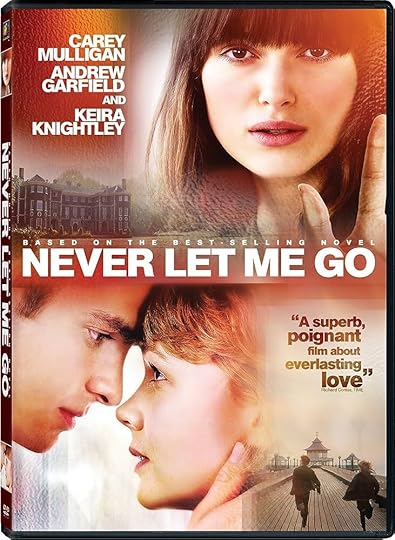 Image from Amazon.com
Image from Amazon.comMOVIE
I would put 2010’s Never Let Me Go movie on the same level as the book, so, good but not my favorite. Still pretty chill, but opened up way more, visually lighter and yet with a couple moments (one in particular) of real creepiness and some tears in the end. I still couldn’t figure out what the appeal of Ruth was for the people around her and seeing it on screen made their lack of rebellion even more bizarre, more obvious. So watch it after reading the book, knowing—as is almost always the case—there will be less depth, less nuance. Meanwhile, it was actually more clear about some things. A decent movie, especially for the YA crowd.
August 1, 2023
Book Review: Friends, Lovers, and the Big Terrible Thing
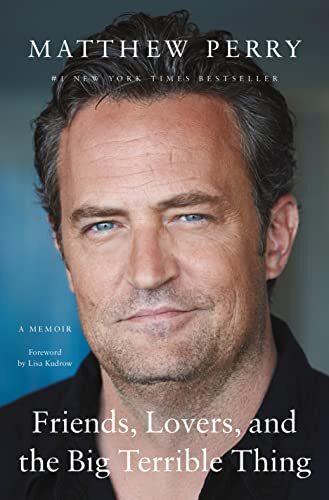 Image from Amazon.com
Image from Amazon.comFriends, Lovers, and the Big Terrible Thing by Matthew Perry was pretty popular, for a little time anyhow: another book floating down the stream of famous people memoir/exposes that rose to the top for one reason or another. Since Friends was one of the most popular TV series of all time and Perry’s battles with alcohol and drugs (and his weight) were played out in the tabloids and discussed over many-a-dinner-table during the 90s and early 2000s, it makes sense that people would want to read the book that would tell the truth about it all. I have a thing for memoirs of famous people if they claim to tell the truth and others claim they are decently written. From what I can tell, Perry did tell the truth and it was almost decently written. Decently enough to get the details, marvel at the strangeness and bittersweetness of his life, root for him, and then get out.
Matthew Perry is an actor best known for his role as Chandler on Friends. He has also done some movies like Fools Rush In and The Whole Nine Yards and other shows like Studio 60 on the Sunset Strip, Mr. Sunshine, Go On, and The Odd Couple (not the one from the 70s). Now mostly writing and producing, it was difficult for Perry to maintain a career while he battled with alcoholism, addiction, and his personal life, which is more what this book is about. The book begins at a low point of near-death in the hospital then moves backward to the beginning—a surprising place where his mother is assistant to the prime minister of Canada and his dad is the Old Spice man. Then it bounces around a bit, never quite establishing where in the story each vignette is (at least for someone not an expert in his career, like me), but creating, even so, a picture of what it was like to be Matthew Perry, which ends with the conclusion that he would have given up all the amazing things—and there were some amazing things—for the life of a healthy, un-addicted, “normal” person. Because being Chandler made life anything but normal and his addictions often made his life a living hell.
It’s a little hard to explain how I ended up reading this book. I am a fan of Friends. I also like comedic books, though I tend to be hard on them: I want to really lol. And I do have a curiosity about the lives of the famous, but not in a tabloid-y way—I am curious about what it is really like to be just a person who is living a supremely bizarre life, one that so few live. So I guess that explains why I chose this book over, say, Spare by Prince Harry (which I am avoiding) or Becoming by Michelle Obama (which, actually, I would like to read eventually). This is not my usual genre, but I like to read what the masses are reading, sometimes.
It probably won’t make you fall off your seat when I reveal that the writing in Friends, Lovers is not amazing. At times, it’s pretty bad, actually. (He does write for screen, and I have read that he wrote this book without a ghostwriter. So the literary merit is understandably small.) And it’s not particularly funny, not in the way that Chandler is funny—this is a much more serious tour of life—though I did snicker aloud now and again or even read a funny line to my husband. So a little funny, sure, because Perry had to deliver. More often, I read aloud some interesting fact about Perry’s life, Hollywood, or addiction. Since I like reading fame exposes that have some sort of depth to them, I was engaged in the story (stories) and read almost the entire book on a car trip between North Carolina and Syracuse. The last and probably only other similar thing I have read was Little Girl Lost by a young Drew Barrymore, and I was transfixed, then, too. I wasn’t quite as gob-smacked this time, but there were plenty of moments where I said to someone, “Can you believe this?”
Still, the point of the whole thing is to sketch a portrait of someone who has struggled with addiction and therefore pain and failure. It’s not sugarcoated. Perry should have been dead half a dozen times and we read about some of the gross and gory bits as well as about the lost relationships, dashed hopes, and destroyed intentions. Perry wants us to know that he had no say in having this disease, that he has worked hard to deal with it but often been powerless. He gives a lot of credit to his family and friends and ultimately tells us that there is a God and that he has encountered It. The book feels like more than just an apology or an explanation, though, it feels like he’s reaching out with his story to those who also struggle with addiction and to those who know someone who struggles with addiction. It is, after all, rather normal to have to fight those battles, it’s just not normal to have to do it while being one of the most famous people on the planet and making people globally laugh in unison once a week for years. And while there are some Friends stories and other Hollywood name-names stories, ultimately Friends, Lovers is more concentrated on a man alone with his demons and his sobriety companion, thankful for one more day to help another person find one more day of sobriety, themselves. Though the book is seriously disjointed, if you are curious enough, then it’ll be a fine read for you.
 Image from IMDB.com
Image from IMDB.comBONUS REVIEW: FRIENDS TV SERIES
I already mentioned above that I like the show, Friends. I was a little young to appreciate it during its original run, and I was also on a different planet from these hip city-dwellers who were sleeping around and religion-less. I mean, the truth is that the show isn’t exactly realistic in several ways (like their lifestyle versus their jobs), but I’m just saying I couldn’t relate. A decade or so later, I found Friends on streaming and devoured the entire thing. I mean, I had encountered episodes here or there, but it turns out the overarching narrative is really quite compelling (though it does go off the rails a few times, trying to stretch out content to meet the desires of the audience instead of just telling the story and bowing out). But we are always wondering (from episode one!) if Ross will get Rachel. Also, it is fricking hilarious. Yeah, still can’t relate to being a young, single, New Yorker with a questionable moral base, but these characters and situations actually earn their laugh tracks, so, much like Seinfeld and New Girl—other shows I have so little in common with but love—I gobbled up the series, twice, and imagine I’ll do it again. Really, with some of the best moments in TV, some of the quintessential scenes, Friends is likely to remain as ridiculously famous as it was from the beginning, well into the future, and if you appreciate good TV as just good TV, this classic is where to find it.
July 31, 2023
Book Review: It Ends with Us
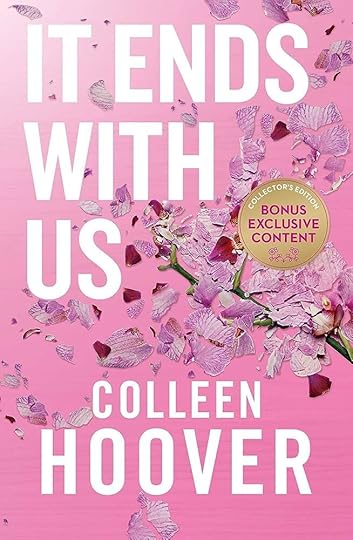 Image from Amazon.com
Image from Amazon.comWhile catching up with reviews, I am surprised that this is still in queue; I feel like I wrote and posted it already. But from my notes and memory, I will let you know that while Colleen Hoover and It Ends with Us is gracing the window dressing of bookstores across America, I was not into this, her most famous book. I found the writing to be subpar, the plot disjointed, and the characters distasteful, though I am still intrigued by Hoover’s personal story and very happy for her. I also would say I never have to read another Hoover—while millions continue to devour them—but I am committed to trying out Verity in the near future.
It Ends with Us is the story of Lily and—well, we’re left guessing who the other half of the “us” is until the, ahem, end. There are two obvious possibilities here: Ryle, the supercharged-hottie-neurosurgeon who Lily meets and then re-meets in an unconventional conversation which can only lead to an unconventional relationship; and Atlas, her high school friend who we meet in flashbacks to a romance that we know is going to end horribly. But then Lily’s dad dies, Atlas shows back up, and Lily decides to go for her dream of owning an alternative flower shop, leading her to that re-meet and down a messy, undulating drain of back-and-forths and intentions versus reality. What happened to Atlas when Lily was a teen? And will Ryle stick with his no-dating rule or succumb to his feelings for the feisty Lily? Things get reeeeeeally complicated.
I want to tell you, straight off, that one of the main themes in It Ends with Us is domestic violence. I don’t know why this is some sort of secret which is not on the cover copy or almost all the write-ups and reviews I’ve seen. Sharing that is not giving anything away; it’s not a spoiler, though I suppose it is more exciting to discover all the secrets of the novel as you go. However, this can be said of most novels, and still we give people a clue as to what they are about to read. Why? Because then they’ll want to read it. Yup. But also, maybe, because they’ll know if they don’t want to read it, for whatever reason. The thing is, there are several relationships that could be dealing with the theme of domestic violence in various ways and the reader has to wait awhile for the deets to unveil themselves, but I think it’s unfair—maybe unsafe for some—not to be up front about this. There are scenes of domestic abuse and rape, and plenty of talking about it. It takes this book from the usual romance to a more women’s fiction kind o’ feel, and also probably what makes many women (and men?) love this particular story.
Personally, I found It Ends with Us boring at times. I never really got to know the characters, especially as experienced (as opposed to told; Hoover told me what these characters were like, sometimes, but I didn’t have a subtle getting-to-know-them experience and felt basically uninitiated, in the end). There weren’t enough friends in the book, either, which would have helped to flesh out the main-er characters, and the few who were there didn’t do nearly enough. I did enjoy how I didn’t see things coming, the plot unconventional in more ways than one. But I also didn’t really get the (not-experienced) characters or like them, much of the time—I even found them laughable (when I wasn’t disgusted with them) and that’s not what Hoover was going with in a domestic abuse (and romance, girl power, etc.) story. I was like, “Run, Lily, run!” from the first ridiculous meeting/scene. Can we call that first scene a meet-cute? Because it wasn’t at all cute to me. I was actually pretty grossed out by it. Throughout the story, I was convinced these people were hot for each other, but romance and love were a much harder sell with more telling than showing and long-winded, sorta dry passages. Which is also why I thought many of the sex scenes were borderline blech: I didn’t feel like there was an emotional build-up or a narrative reason for the steamy scenes to be there. Some of them? Sure. But certainly not all of them. I know I’m not in line with some readers and what they want from a romance, but surely some readers can identify with wanting justification for any scene, including erotic ones. Titillating? Sure. Off-putting? Yes, that too, in some circumstances. (I was also creeped out by some of these scenes in Outlander. My primary reason appears to be the health of the relationship and/or individual.)
For the first half of the book, I was not even really enjoying reading it. But by the end, it had almost converted me by being different, surprising, and trying to be thoughtful. I wouldn’t go back and not read it, but I am not convinced I ever need to read another Colleen Hoover. (My daughter has convinced me to give Verity a try, in the future, as I said above.) After reading Hoover’s endnotes about how she came to write about domestic abuse, I realized that anything I ended up liking in this book (except the unpredictability of the story-telling) was not going to return in her other stories. Those surprising twists of narration and plot are not enough to bring me back if I have to also read Hoover’s writing and deal with more of her characters. Something about it felt (yes, boring, as I said, but also) claustrophobic. Perhaps it is because of the present tense, though I have forgiven present-tense before. I was annoyed by it; it made some sense considering there are a number of flashbacks. Wait, no, it doesn’t make sense, because the flashbacks are epistolary and in italics. So…
And perhaps I should mention the Ellen letters, since they seem to invite either joy or spite from readers. The flashbacks telling the teen story of Lily and Atlas are told through old entries that Lily had written in a journal—in the form of letters to Ellen Degeneres. Yeah, it’s a little weird. I was torn between really liking this little, random touch and wishing Hoover had created a fictional famous person. And in the end, there is no reason for the device, at all. Also, did Poppy feel super inconsistent to anyone else? She’s so bubbly and funny and rebellious, but she also has no social life, no attachment to home, and even the relationship with her mother doesn’t seem to be consistent from one life-stage to the next. Also-also, something felt off to me about the messaging in this book. Like just because one character has been in therapy for a long time means they are now past redemption? And there’s no attempt at change (like, after the other person has moved on at a safe distance, but still…)? It felt… emotionally unfinished, somehow. Like we were almost there, but a sour note was still playing in the background, which shouldn’t surprise me too much because on many levels this book is just a cheesy, not amazingly-written, romance novel and that’s how the cover copy sold it to me. But then there’s something in it that’s tugging at deeper things, wanting to have a chat with some of these women about real life (which Hoover says is the point of the book, to encourage/empower women in domestic abuse situations). Hmm… (There’s also a very small scene where suicide is taken kinda lightly.)
So no, not for me, though clearly for everyone else in this country and beyond it. Colleen Hoover is the name in romance or women’s fiction, right now. She’s making like a billion dollars and I (and plenty of others) have been paying attention to her because she came outa nowhere (meaning she was writing self-published books out of her trailer home while raising kids and working in social work and teaching before a publishing house took her seriously and, something like ten years later, BookTok catapulted her into fame and fortune). Like I said, so happy for her. But I don’t need to read a bunch of her books. I’m a fan of her success, but not It Ends with Us.
QUOTES:
“I can’t be upset that I’m not enough to make a guy want to remap all of his life goals” (p75).
“No matter how convinced you are that your life will turn out a certain way, all that certainty can be washed away with a single change in tide” (p209).
“You are my wife. I am supposed to be the one who protects you from the monsters. I’m not supposed to be one” (p241).
“People spend so much time wondering why the women don’t leave. Where are all the people who wonder why the men are even abusive? Isn’t that where the only blame should be placed?” (p274).
“I think that’s one of the biggest signs a person has matured—knowing how to appreciate things that matter to others, even if they don’t matter very much to you” (p280).
“I’m beginning to think closure is a myth” (p307).
“Sometimes even grown women need their mothers’ comfort so we can just take a break from having to be strong all the time” (p331).
“If [name] truly loves you, he wouldn’t allow you to take him back. He would make the decision to leave you himself so that he knows for a fact he can never hurt you again” (p336).
“When you experience it firsthand, it isn’t so easy to hate the person who mistreats you when most of the time they’re your godsend” (p341).
“And as hard as this choice is, we break the pattern before the pattern breaks us” (p360).
“Cycles exist because they are excruciating to break. It takes an astronomical amount of pain and courage to disrupt a familiar pattern” (p360).
MOVIE:
The movie is in production, but has been put on pause during the WGA writer’s strike (and now SAG strike) of 2023.
July 14, 2023
Book Review: People We Meet on Vacation
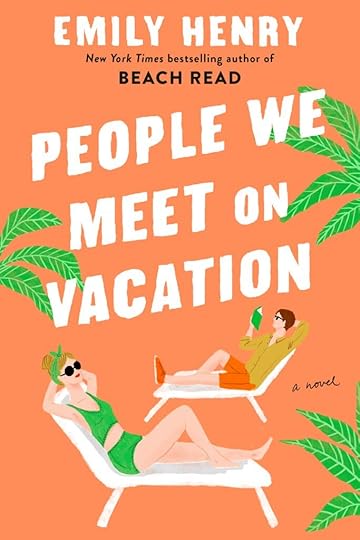 Image from Emily Henry’s website.
Image from Emily Henry’s website.I read a lot of literary stuff, but as I get older I also read a bit of fluff. When I am on vacation, I reach for at least one fluffy book, and Emily Henry has become a staple for those moments (though she only has four adult, romance books at this time, so I’ll have to find other titles and authors for the future). People We Meet on Vacation was the second adult, romance novel she wrote and is, in some ways, bumpier than the two that surrounded it while also being more aspirational. She is a writer whose actual writing is improving with time, though even her original stuff has made her ridiculously popular. Vacation is not as straight-forward, genre-wise, but it is an entertaining book that will keep you happily engaged for any beach vacation in which you want an easy, breezy, romantic read with decent writing chops and lacking in laughably bad moments. Because Henry is not just fluff; it’s also pretty good story-telling with engaging characters and well-defined settings and stakes.
People We Meet on Vacation jumps back and forth in time, from Poppy’s present situation on the outs with her life-bff to a run-through of all the previous summer vacations she has taken with Alex. It’s been two years since their falling out and more than a decade since their unlikely meeting in college when Poppy realizes that the one thing that brings her happiness in life is Alex, not the amazing career she has created in the Big Apple, so far from their small, hometown. So she manages to talk (perhaps trick) Alex into another trip, putting her job on the line in order to put the pieces of their unlikely relationship (she’s an artistic, wild free-spirit and he’s a buttoned-up, nice boy) back together with yet another amazing trip. But will he see through the white lies? And will Poppy finally face the truth about their relationship and herself? And what else could possibly go wrong on the vacation that needed to go perfectly right?
I will admit that I am getting my experience with Vacation mixed up—at least emotionally and a tiny bit—with Colleen Hoover’s It Ends with Us, simply because I chain-read one then the other romance/women’s literature novels while on one vacation. However, I am one hundred per cent sure that Emily Henry is a romance author I can enjoy happily every once in a while, and that she is going to be one of the only ones. Despite how frickin’ huge Colleen Hoover is at present, I did not like her (most popular) book as much as a Henry. Actually, not even close. I’m sure that will raise some hackles, and we’ll talk about it in the next review. But that’s how it is for me. Henry is a fairly solid, genre writer who nails the romance tropes and expectations and delivers it with sustained sizzle, fun characters, an enjoyable cast, and lots of twists and turns and action.
I did use the adjective “bumpier” earlier in the review, because this particular book can be confusing with the many time shifts, and is also long-winded. We didn’t need quite so much information about all those vacations, quite so many back-and-forths, quite so much time in the past. But I would still recommend the book for someone who likes reading in the genre. Also, I’m still mystified by Henry’s titles. This title doesn’t capture the book at all. I mean, is this book about the people we meet on vacation in any way? (They meet people, but that’s peripheral to the core relationship.) It’s about the people we take on vacation. It’s about vacations. And, as always, it is about someone who writes for a living (though this time it’s a travel writer who starts out as a blogger). The bright covers, at this point, are just a signal for a modern book, likely a romance, and one written by Henry. If you want a real idea of what it’s about, you’ll have to go past the title and cover.
QUOTES:
“’…sometimes, when you lose your happiness, it’s best to look for it the same way you’d look for anything else …. by retracing your steps’” (p23).
“Apparently the completion of long-term goals often leads to depression. It’s the journey, not the destination, babe…” (p23).
“’It’s not your job to make me happy, okay? You can’t make anyone happy. I’m happy just because you exist, and that’s as much of my happiness as you have control over’” (p303).
“Maybe things can always get better between people who want to do a good job loving each other. Maybe that’s all it takes” (p310).
“Suddenly we’re not kids anymore, and it feels like it happened overnight, so fast I didn’t have time to notice, to let go of everything that used to matter so much, to see that the old wounds that once felt like gut-level lacerations have faded to small white scars, mixed in among the stretch marks and sunspots and little divots where time has grazed against my body” (p336).
MOVIE:
The movie has been green-lighted as the first Emily Henry novel to go to the big (or small) screen (as a movie). Two others of her books are also in production, just later in the process. There aren’t any real details, though, yet, except that Brett Haley will direct, Yulin Kuang already adapted the book to screenplay, and 3000 Pictures is the studio producing it. We might see it in the next year or so (perhaps allowing for all these industry strikes). Although romantic comedies are supposed to be “dead” or at least “dying,” I can’t imagine millions of fans won’t flip out at the first preview they see of an Emily Henry novel.
July 12, 2023
Series Review: Percy Jackson & the Olympians
I’m sure to catch it for this review, but I was not at all impressed or even very entertained by the Percy Jackson & the Olympians book series. In the original five books that put the otherwise-teacher and -father Rick Riordan on the map, his famous Percy Jackson goes from age twelve to age fifteen and I slogged my way through the story (which was built similar to a Harry Potter series with an overall story arc and each book having its own stories and mini-arc). The overall story was not as strong or clear as each books’ story, and didn’t really compel me to move from one book to the next with a real strong question (or feeling). And, quite frankly, the writing was not so great. Meant for middle graders, that’s the strongest likelihood of an audience for a Greek-myth-based, modern Americanized, youthful series with subpar writing. On the other hand, so many adults love this series it leaves me baffled. I have recommended series before that lack literary acrobatics or wordsmithing flair (aka voice) because they told a great story and had other merits (like the Harry Potter series), but I do not agree with many others that Percy Jackson is on the same level as these other books. They are also not the worst MG series I have ever read (here’s looking at you, Land of Stories). And I would actually recommend them for middle graders who would be interested in the subject matter and characters (especially the ADHD Percy) as most of them are not especially discerning (and aren’t likely to ask where, say, the depth of the characters has disappeared to). Otherwise, I’ll let other reviewers recommend this series to the rest of you and I will say, “Pass.” There are so many great books out there; I’m happy to let Riordan sit on his MG throne while I move on without him.
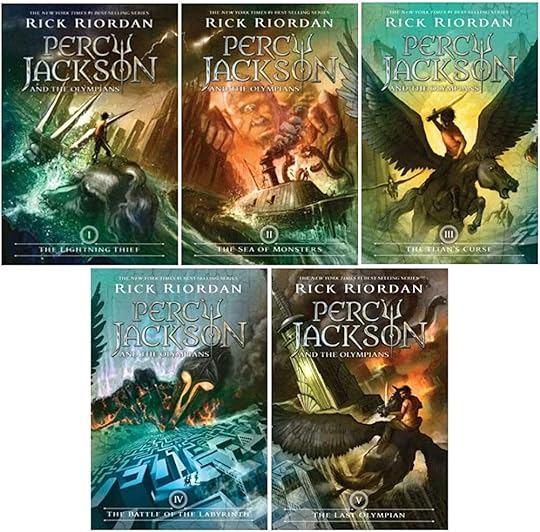 Image from Amazon.com
Image from Amazon.comFor those of you who have been under a rock for a couple decades, the Percy Jackson series consists of five (original) books. Percy is just a normal, hyper, New-York-dwelling, 12-year-old kid who can’t seem to keep it together long enough to not get kicked out of school. But when he starts seeing things from Greek myth, he learns that his single mom might have had a fling with a Greek god, making Percy—Perseus—a demigod. But being a demigod is dangerous business as powers reveal themselves and monsters come out of the woodwork (or “mist”), and Percy is whisked away amidst flame and disaster (a theme throughout the series) to Camp Halfblood, where demigods train each summer and learn their real history. But when Percy discovers who his father is, he also shoulders an enormous prophecy that will pit him both against the gods and against those who would seek to overthrow them. Can Percy become the hero of the century to save Olympus from the forces that ally against it? Or will he take it down, instead?
As I said, each book has a particular story. The Lightning Thief (which is the name that I thought was the name of the series and perhaps some people call it that) lays the groundwork for Percy and for our world (which necessitates that the gods and monsters move with “the seat of Western culture” and are currently in the USA. While this created some real imaginative highlights in the series, I also found the premise to be uncomfortably national-centric). In the first book, Percy finds out he’s a demigod, who his father is, that he is probably the prophecy’s intended, and then sets off on an official quest to stop a war of the gods by travelling to the Underworld. In The Sea of Monsters, Percy has to save his best friend/satyr as well as Camp Halfbood by crossing the Sea of Monsters, a la Odysseus, strengthening friendships and forming new ones. The Titan’s Curse sees Percy at two-years-on crossing the country to save his other bff—daughter of Athena, Annabeth—and Athena herself as the grand plan of the titans takeover takes a more solid form. In The Battle of the Labyrinth, everyone joins in (including the cyclops, Tyson, and normie Rachel) as the action movies underground into an ever-growing Labyrinth swarming with baddies in an attempt to thwart the continuing plans of the titan army. And finally, in The Last Olympian, the looming war shifts to New York City as everything comes to a head while the gods are drawn away from Olympus, leaving the balance of the status quo world in the hands of the gods’ and goddesses’ demigod children. How is the prophecy going to play out? Just what sort of hero does the modern world need?
And now, in accordance with the tradition of my way too long series’ reviews, I will walk through my thoughts after reading each book in the series:
The Lightning Thief
Before reading, I was told that the Percy Jackson books bridge the gap between MG and YA. But as soon as I began—despite the introspective, first-person narration—I found the first book to be veeeery MG. It moved super fast. It was predictable. I doubt you could surprise many adults (and maybe teens) with any of it. The book used Greek myths, etc. in a simplistic, kinda teach-y way. In other words, it’s perfect for bedtime stories for Riordan’s young son, which is literally where the series came from. I was torn. It didn’t feel like a comfortable read for an adult, even though there are many MG, YA, even children’s books I would happily recommend for a wide, even complete, audience. However, there was a part of me that couldn’t put it down, though this was conflicted because A) I really felt I already knew everything that was going to happen (and I did) and B) it was partly because the reading was so darn easy that it was relaxing for my brain as opposed to challenging. I like to read books in both the relaxing and challenging categories, I guess, but I prefer to end up somewhere in the middle-to-the-somewhat-challenging side.
Furthermore, the book is chock full of silly things, things that just don’t quite add up and therefore distract from the story, like when Percy crashes a bus next to a river (on purpose) but doesn’t use the river (which makes more sense when you know about his powers and their specifics), just stays on the bus? He doesn’t even carry water with him, ever?. Etc.
My son hates reading, but at 14 I could totally see him reading this series. At 14, it would be WAY easy for most kids his age, and perhaps a little immature, but easy and maybe even immature is what some 14-year-olds need to enjoy a book (series). Maybe that’s what many adults need, too. (Update: I did put the first book in his hands and my husband scheduled reading time (where they each read their own book) with him. He actually likes this book, as I predicted. Eventually, I think he’ll read his way through the whole series.)
The Sea of Monsters
The writing, or maybe it’s the editing, is getting worse, as is often the case with a series. There are missing words throughout. I counted at least ten obvious ones. Action scenes are more far-fetched, even for fantasy (like whenever someone is falling they have like several minutes to get it together and figure things out) and other silly, unrealistic (for the Percy Jackson world) things. Sea of Monsters is reading like a book for late elementary school, even though some of the themes are late middle school. It’s just, well, it’s cheesy and not well-written. Among other issues, there are many goofy (that’s me being nice) similes, even some that really don’t work but, at best, they’re distracting along with much of the below-par writing. I always get distracted by this, which is why—even when a book isn’t going to be flowery, poetic, or literary/beautiful, I like the writing to be clear (read: undistracting). As for regurgitating Greek myths with a fun, child-friendly spin, that’s still all the same. In the second book, there’s nothing really new, except for the conflict of good guy/bad guy with the new character, Tyson. Sort of. Because once again everything is obvious if you’ve ever read a book or even watched a movie in your life. I don’t know how I’m going to keep going, but I am still surrounded (sparsely, but still) by adults who are fans.
It’s also clear to me now that the first book was based on the story of Perseus, and this one is based on Odysseus. Loosely, at least, the remaining books are based on Hercules, Theseus, and Achilles.
The Titan’s Curse
Well, the writing is still, um, silly, to me. It’s just so juvenile and full of holes and inconsistencies I still don’t understand how adults enjoy this series. I get how middle schoolers would, but I’m forcing myself through this, hoping I’ll get more invested in this essentially surfacy and predictable story. I appreciate that the pacing moves so fast and I guess I appreciate the fun world-building and the use of the ancient Greek myths, but… It’s definitely not CLOSE to enough, for me. I’m just too sophisticated as a reader to get lost in this series. (Kidding, not kidding.) I had to re-read one sentence a few times before I realized it was utter nonsense and something had happened with the printing.
The Battle of the Labyrinth
I find that if I stick it out with a series that I don’t especially love—at least ones that are beloved by others—I get to a point where my investment in the story and involvement in the characters makes the reading seem more enjoyable and I begin to ignore the problems I was distracted by before. That’s not always true (for example, the Land of Stories series or Pseudonymous Bosch’s Secret series, both of which I struggled through right up to the end (or to where it ended at the time)). But it has happened, finally, with Percy Jackson (on book four out of five). The writing is what I would consider pretty terrible, but at this point I like Percy enough and have enough questions about what is going to happen that I am somewhat enjoying the series.
Never fear: it is not going to be a favorite, even if I completely black out from pure readerly pleasure for the last book. (It is unlikely I will, anyhow.)
Even still, I can feel the whole time that this series is meant for middle schoolers and not for me. And it’s still rough reading as far as scene-blocking, sensical sentences, and reeeealy stretching the Greek mythology thing. And yet I found in this book, more than the others, that some of the mythology-meets-modern-world things were pretty clever. Some not. But some so (like the flesh-eating horses being on a Texas ranch). And I did wonder now and again at how it is a little strange that the gods had moved to the seat of the Western world which is currently in the US (which I mentioned in the overall review). Hmm… The thing that most annoyed me about this book was the way it tried to not say things. Like in order to introduce Percy (and the readers) to information at the right moment in the story, the delays are hardly inspired and somethings stupidly laughable. Like a character will be slightly offended and pout for hours sitting next to Percy so that he doesn’t find out what’s going on at Camp Halfblood until they get there, because obviously that’s more interesting. But weird.
The Last Olympian
I am reading now because I want to see what happens, and it might even be that the writing has improved by the fifth and final book of the series. But I still know that what I’m reading is often problematic in the literary sense and also that it is meant for middle grades readers and not me: a critical forty-something who also devours Zadie Smith and George Saunders. However, I have finally become compelled enough, probably by the romance (which is neatly PG, even as the characters top out at fifteen years old). I have learned by this point in my life that I am a sucker for protagonists and “good people” ending up together. Even though the romance is in the background and sorta hanging on by a thread, I would like to see it resolved. So, I finish reading every last word of the series.
So by now in the review you certainly get what my opinion is. Without having gone into too much detail about it (which I can sometimes do), I am not a fan of the writing in the series and am a bit baffled by Riordan’s crazy popularity. However, the series is good enough for hooking a kid into reading if mythology or middle grades boy perspective is their thing. As for adults or even older teens reading the series, I would say look elsewhere. I am a big fan of other fantasy series, such as Harry Potter, anything I’ve read so far of Leigh Bardugo, or Lord of the Rings. For reading related to Greek mythology, I would recommend Korwin Briggs’ Gods and Heroes for kids, Edith Hamilton’s Mythology, C. S. Lewis’s Till We Have Faces, Madeline Miller for adults, or even Gareth Hinds’ graphic novels. As for middle grades, there is a whole list of my recommendations HERE. But if you decide to give this series a try, anyhow, then you’ll join a long line of fans and superfans.
As for continuing reading, Riordan has expanded the series with several related series. Here they are:
Percy Jackson & the Olympians: The Lightning Thief, The Sea of Monsters, The Titans Curse, The Battle of the Labyrinth, The Last OlympianHeroes of Olympus (sequel series to the original): The Lost Hero, The Son of Neptune, The Mark of Athena, The House of Hades, The Blood of OlympusThe Sun and the Star (which is a new continuation of the series which may continue as a Nico di Angelo series or a series featuring different characters)The Trials of Apollo (continuing sequel series): The Hidden Oracle, The Dark Prophecy, The Burning Maze, The Tyrant’s Tomb, The Tower of NeroThe Kane Chronicles (takes place in same universe at same time, story-line unrelated, Egyptian mythology): The Red Pyramid, The Throne of Fire, The Serpent’s ShadowMagnus Chase and the Gods of Asgard (takes place in the same universe at the same time, story-line unrelated, Norse mythology): The Sword of Summer, The Hammer of Thor, The Ship of the DeadDaughter of the Deep (completely unrelated, based on Jules Verne)The 39 Clues (which Riordan wrote the first book of (The Maze of Bones and the entire series’ arc, then passed off to other authors)Also note that there are “Rick Riordan Presents” books (like one of my son’s favorite series, Tristan Strong, which happens to be similar to Percy Jackson but in a African and African-American mythology world). These are not related to any Percy Jackson world nor are they written or co-written by Riordan. Rick Riordan Presents is simply an imprint of Disney/Hyperion and Riordan, apparently, helps pick them out (approximately quarterly), edit them a bit, and promote them to the world by attaching his name. They are often similar to the Percy Jackson books in some way—like middle grades with world mythology.
QUOTES:
The Lightning Thief
“Oh, I love mortals—they have absolutely no sense of perspective. They think they’ve come so-o-o far” (p68).
“’Were you reading my mind or something?’ / ‘Just your emotions’” (p158).
“What I did next was so impulsive and dangerous I should’ve been named ADHD poster child of the year” (p164).
“Whatever else you do, know that you are mine” (p346).
“If my life is going to mean anything, I have to live it myself” (p352).
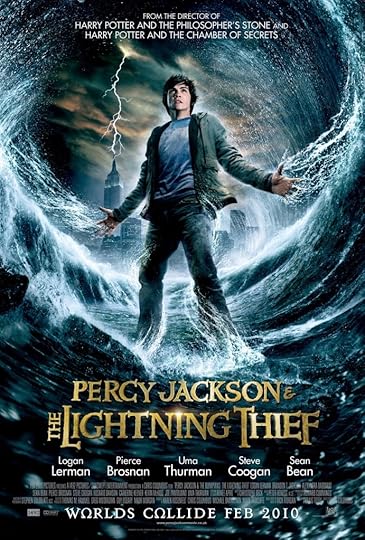 Image from IMDB.com
Image from IMDB.com
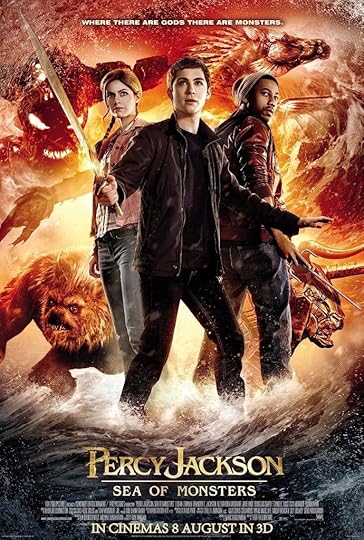 Image from IMDB.com
Image from IMDB.comMOVIES:
There are two movies based on the first two books, from 2010 and 2013. I reviewed the first one HERE. Though plenty of people saw them and even liked them, they were basically flops that have had a lot of bad reviews. Riordan has always been angry about them, especially since they were so different from the series, being cast with much older kids, etc. In response to and with indifference to those old movies, there is a TV series that is currently in production which Riordan is directly involved with (a la the new Harry Potter series). The series is set to release in 2024 on Disney+. Personally, I wonder if I will like it better than the book series.
 Image from Teen Vogue online.
Image from Teen Vogue online.
June 23, 2023
Book Review: Eleanor Oliphant Is Completely Fine
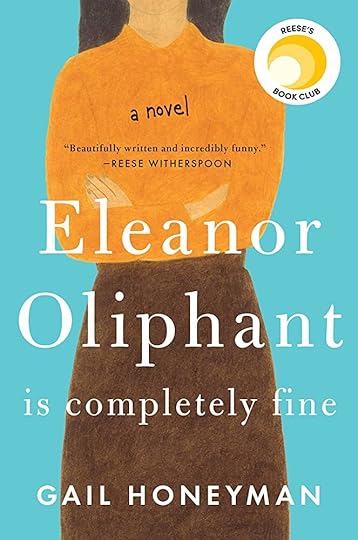 Image from Amazon.com
Image from Amazon.comAs with many of the other books I’ve read lately, I am divided in my opinion about Eleanor Oliphant is Completely Fine (2017) by Gail Honeyman. It has been a popular book and its Goodreads rating is at 4.25—which is very impressive—but I both liked it and didn’t like it. Eleanor is engaging, one hundred per cent, and Honeyman’s writing is really good, but the plotting was full of strange choices, sometimes ones that seemed like they wanted more to be trendy than to do the thing that was right for the story and/or characters themselves. I wouldn’t say not to read it. But I would talk you down a few notches before beginning, because—among many other things—therapy is not a proper story resolution nor is a story’s truth always consistent with the author’s opinion of it, in my not-so-humble opinion.
Eleanor Oliphant is in her late twenties, successful at her job but completely out to sea when it comes to anything involving any other human beings. She’s quirky, sure, but she’s also incapable of understanding the people around her and revels in her isolation. When she attends a random band show with a coworker, she sets eyes on the handsome musician who she decides is obviously the man she is destined to be with. So she starts to reason and plan her way toward their special, “chance” meeting, the mysterious Mummy devilishly encouraging her from the background. While the reader is trying to figure out what on earth has happened with this Mummy that would make Eleanor so hurt, bizarre, limited, isolated, and an orphan, the real human contact ensues between Eleanor and a new co-worker who both draws Eleanor out and disgusts her. How did life get this way for Eleanor? And how long can she sustain it before it—or she—falls apart?
Let’s see. I found Eleanor Oliphant to be very disjointed, both in tone and even in the characters as they appear in the first and second “halves” of the book. (They are not perfect halves, the first of two distinct spirit-sections being longer than the second.) At first, the book is depressing and close (even while somewhat interesting). Also, I definitely thought Oliphant was on the autism spectrum (and we’ll talk more about that in a bit). The book is very tense and I had the feeling there were both some horrible thing in the past and something horrifying just around the next corner. But then all of a sudden I was at the terrible event but it didn’t deliver, it wasn’t that bad, though Eleanor’s reaction was what I expected as far as stakes were concerned (which made that pretty strange because the climactic event wasn’t that exciting). Then the characters and tone got much cheerier and lighter and the tension transferred to finding out what happened in the past—which almost delivered but for like one whole sentence or something and that was IT… cheery again. (Also, I saw all the twists coming. Some people who didn’t were annoyed because the big twist was unnecessary to the story and therefore felt sensationalist but not authentic or even accurate to clues given earlier. I agree with them. One of the lists I found in a review about why the twist doesn’t work was impressive, I thought, and very convincing.) Anyhow, because of the incongruence of the tone and characters and the lack of delivery on the big moments (including an open ending regarding the romance), I just can’t be as excited about this book as some people are.
Plus, I was really confused about Eleanor. I totally read her as on the spectrum, and it turns out I was far from the only one. Like, I had no doubts until there were some clues that the author was not on that same page. I am familiar with trauma and, to a lesser extent, autism. Eleanor behaved and thought like she was a poster child for someone who is on the spectrum and kinda-sorta functional. If Honeyman wanted us to think about the similarities between trauma reactions and autism, she could have done that, but that’s not what she was doing, so I and many other readers were left confused by Honeyman’s insistence that Eleanor is definitely not autistic. And by the end, I believed Honeyman, except I didn’t. Sure, Eleanor seemed off the spectrum by the end, but that didn’t feel at all believable considering the Eleanor I had just been reading about for hundreds of pages—the one who appeared to be both on the spectrum and have trauma which was not successfully dealt with. And while it’s of note that the author says Eleanor is definitely not autistic, I don’t think that’s the end of the discussion. (What an author says about a book doesn’t always match up with the reader experience, and sometimes the truth of the matter seems to lay heavier with the reader(s).) Then again, since Eleanor at the beginning and Eleanor at the end seem so different… I’m not sure it’s a discussion worth having. It feels more like a writer mistake.
Still, there are some virtues to extol in Eleanor Oliphant is Completely Fine. It has been wildly popular, a first novel of a woman in her 50s (who has not announced any more specific projects since its publication in 2017). The book is definitely funny. Eleanor is a very compelling character (though I was so WORRIED because of my read on her—so while I was fascinated by her I was also a bit stressed out). The adjective of choice in the reviews for Eleanor is “quirky.” She’s also Scottish and it was nice to have a novel set in Scotland, for a change. (I refuse to count the Outlander series.)
In the end, I would have advised Honeyman to follow her characters through their story, which would mean Eleanor was still on the spectrum at the end, the climax would have been much more horrific (leaving her much more maligned and hurt), the twist would not have been there or we would have found out earlier, and we would have spent way less time in the therapy room (because, I’m sorry because I WAY believe in therapy, but therapy as a resolution to a story is boring as crap). Also, Raymond and Eleanor would have actually resolved, romantically. I think Honeyman was trying to have a big twist and avoid a conventional romance because those things are hip right now, but neither of those choices fit Eleanor or Eleanor Oliphant, unfortunately. I appreciate Honeyman trying to give us a character to identify with all the loneliness that the Pandemic and modern life has brought us. The book is full of fun insight and engaging snark, and it has enjoyable characters and situations, but it ends up being a strange cocktail of bitter and sweet.
QUOTES:
“I do exist, don’t I? It often feels as if I’m not here, that I’m a figment of my own imagination” (p5).
“The goal, ultimately, was successful camouflage as a human woman” (p26).
“When the silence and aloneness press down and around me, crushing me, carving through me like ice, I need to speak aloud sometimes, if only for proof of life. / A philosophical question: if a tree falls in a forest and no one is around to hear it, does it make a sound? And if a woman who’s wholly alone occasionally talks to a potted plant, is she certifiable?” (p51).
“Eyelids are really just flesh curtains. Your eyes are always ‘on,’ always looking” (p72).
“[The shiatsu head massage] ended about nine hours before I would have liked it to” (p149).
“LOL could take a running jump. I wasn’t made for illiteracy; it simply didn’t come naturally. Although it’s good to try new things and to keep an open mind, it’s also extremely important to stay true to who you really are. I read that in a magazine at the hairdressers” (p174).
“I suppose one of the reasons we’re all able to continue to exist for our allotted span in this green and blue vale of tears is that there is always, however remote it might seem, the possibility of change” (p182).
“I’d made my legs black, and my hair blond. I’d lengthened and darkened my eyelashes, dusted a flush of pink onto my cheeks and painted my lips a shade of dark red which was rarely found in nature. I should, by rights, look less like a human woman than I’d ever done, and yet it seemed that this was the most acceptable, the most appropriate appearance that I’d ever made before the world. It was puzzling” (p191).
“Grief is the price we pay for love, so they say. The price is far too high” (p198).
“I couldn’t keep passing through life, over it, under it, around it. I couldn’t go on haunting the world like a wraith” (p220).
“If they liked you—and, I remembered, Raymond and I had agreed that we were pals now—then, it seemed, they were prepared to maintain contact, even if you were sad, or upset, or behaving in very challenging ways. This was something of a revelation” (p236).
“If someone said, Please could you describe yourself in two words, and you said, ‘Erm… let me see… Angry and Sad?’ then that really wouldn’t be good” (p251).
“I know she’s only a cat. But it’s still love; animals, people. It’s unconditional, and it’s both the easiest and the hardest thing in the world” (p286).
MOVIE:
Forthcoming from Reese Witherspoon and her Happy Sunshine company.



